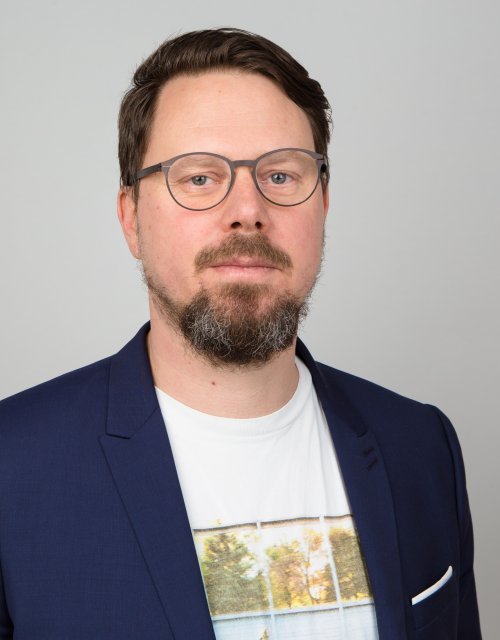- Sandro Gaycken
- Bio
- Publications
- Work in progress
- Working papers
- Interests
Sandro Gaycken

2018September_CV_DrGaycken-1-2.pdf
PDF, 812.98 kB
-Founder & former Director, Digital Society Institute, ESMT Berlin
-Director, NATO SPS Projects Cyberdefense
-Oxford Martin School Fellow
-Senior Advisor, Harvard Kennedy School AI Initiative
-Committee member, Harvard-MIT conferences on cyber norms
-Co-lead, CNAM Programme Transverse Sécurité Défense
-Permanent reviewer, IEEE
-Vice representative, Cydef Executive committee
- Director of Research for Cyber-Stability,
French National Research Center for Defense, Security, Terrorism and Radicalization at Cnam
Dr Sandro Gaycken is the founder and former director of the Digital Society Institute at ESMT Berlin. He has published five scientific monographs, three on cyberwarfare, and more than 60 other scientific publications on cybersecurity. Sandro is an Oxford Martin School Fellow, a program committee member of Harvard-MIT’s annual conference series on cyber defense and cyber norms, a Senior Advisor for the AI Initiative at Harvard Kennedy School, co-lead “Programme Transverse Sécurité Défense, Sec. Cybersecurity” at elite French university CNAM, an EastWest Senior Fellow, a Senior Fellow of the German Council on Foreign Relations, a member of the Conversation Circle Intelligence Services in Germany, and an IEEE permanent reviewer. As an advisor to the German government, he developed the German foreign cyber policy strategy, testified numerous times in German parliament, and conducted many parliamentary dialogues. He was instrumental in bringing about the German chancellory’s German-Chinese No-Spy agreement, in the White House USTR’s effort to mitigate industrial espionage, and in IAEA and G8 efforts to control nuclear cybersecurity. In cyber military affairs, Sandro served as part of the German MoD’s cyber defense white book process, and moderated interdepartmental cyber coordination efforts. He serves as an expert witness in NATO military cyber counterintelligence cases, and as director in NATO’s SPS program, which develops and implements national cyberdefense strategies and technologies in the Middle East region. As an industrial advisor, Sandro has conducted nine major industry studies, ranging from smartgun and semiconductor component security assessments to strategic industry development issues. He advises large German cyber investors such as ammer!partners and Allianz ventures, developed Allianz’s cyber risk assessment methodology, and produced a buyer’s guide for the German DIHK and SME community, which lists 120 external criteria to assess the security quality of an IT-product. Sandro also founded the high assurance security company SECURE ELEMENTS Ltd., which offers impenetrable embedded systems and highly secure execution environments. Devoted to an open discourse and public enlightenment, he writes frequent op-eds in leading German newspapers like Handelsblatt, FAZ, Süddeutsche, and DIE ZEIT, and he comments regularly on cyber matters on mainstream media outlets such as Tagesschau, Heute, NTV, N24, CNN, BBC, Bloomberg, Forbes, The Economist, The Guardian, The Times, Wired, Vanity Fair, and Al Jazeera.
-Director, NATO SPS Projects Cyberdefense
-Oxford Martin School Fellow
-Senior Advisor, Harvard Kennedy School AI Initiative
-Committee member, Harvard-MIT conferences on cyber norms
-Co-lead, CNAM Programme Transverse Sécurité Défense
-Permanent reviewer, IEEE
-Vice representative, Cydef Executive committee
- Director of Research for Cyber-Stability,
French National Research Center for Defense, Security, Terrorism and Radicalization at Cnam
Dr Sandro Gaycken is the founder and former director of the Digital Society Institute at ESMT Berlin. He has published five scientific monographs, three on cyberwarfare, and more than 60 other scientific publications on cybersecurity. Sandro is an Oxford Martin School Fellow, a program committee member of Harvard-MIT’s annual conference series on cyber defense and cyber norms, a Senior Advisor for the AI Initiative at Harvard Kennedy School, co-lead “Programme Transverse Sécurité Défense, Sec. Cybersecurity” at elite French university CNAM, an EastWest Senior Fellow, a Senior Fellow of the German Council on Foreign Relations, a member of the Conversation Circle Intelligence Services in Germany, and an IEEE permanent reviewer. As an advisor to the German government, he developed the German foreign cyber policy strategy, testified numerous times in German parliament, and conducted many parliamentary dialogues. He was instrumental in bringing about the German chancellory’s German-Chinese No-Spy agreement, in the White House USTR’s effort to mitigate industrial espionage, and in IAEA and G8 efforts to control nuclear cybersecurity. In cyber military affairs, Sandro served as part of the German MoD’s cyber defense white book process, and moderated interdepartmental cyber coordination efforts. He serves as an expert witness in NATO military cyber counterintelligence cases, and as director in NATO’s SPS program, which develops and implements national cyberdefense strategies and technologies in the Middle East region. As an industrial advisor, Sandro has conducted nine major industry studies, ranging from smartgun and semiconductor component security assessments to strategic industry development issues. He advises large German cyber investors such as ammer!partners and Allianz ventures, developed Allianz’s cyber risk assessment methodology, and produced a buyer’s guide for the German DIHK and SME community, which lists 120 external criteria to assess the security quality of an IT-product. Sandro also founded the high assurance security company SECURE ELEMENTS Ltd., which offers impenetrable embedded systems and highly secure execution environments. Devoted to an open discourse and public enlightenment, he writes frequent op-eds in leading German newspapers like Handelsblatt, FAZ, Süddeutsche, and DIE ZEIT, and he comments regularly on cyber matters on mainstream media outlets such as Tagesschau, Heute, NTV, N24, CNN, BBC, Bloomberg, Forbes, The Economist, The Guardian, The Times, Wired, Vanity Fair, and Al Jazeera.
Loading...
Der von Ihnen ausgewählte Inhalt ist nur auf Englisch verfügbar. Möchten Sie fortfahren?
Ja.
Nein.